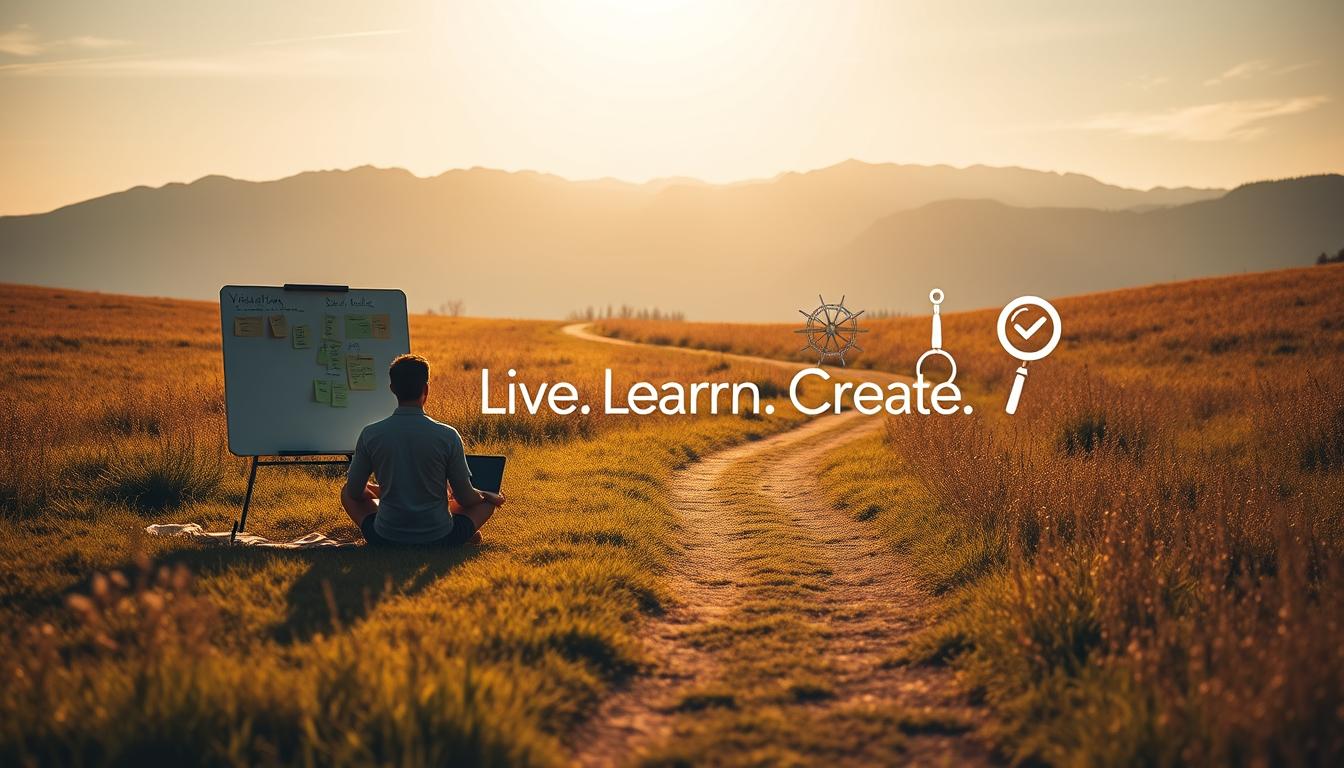“You alone are enough. You have nothing to prove to anyone.” – Maya Angelou
Feeling like an imposter can really hold you back. It makes you question your skills and achievements. But, you’re not alone. Many people who have made it big have felt the same way.
As we look into ways to beat imposter syndrome, you’ll learn to quiet your inner critic. You’ll also find ways to increase your self-confidence.
By adopting a positive mindset and using Mindset & Motivation strategies, you can overcome imposter syndrome. For more help, check out books like “The Gift of Fear” by Gavin de Becker or “Daring Greatly” by Brené Brown.
Key Takeaways
- Cultivate self-belief by recognizing your strengths and accomplishments.
- Develop a positive mindset to overcome self-doubt.
- Leverage Mindset & Motivation strategies to boost confidence.
- Explore self-help resources to support your journey.
- Practice self-compassion and challenge your inner critic.
Understanding Imposter Syndrome and Its Effects
Imposter syndrome makes people feel like they’re not good enough, even when they’ve achieved a lot. It’s when you doubt your success and worry about being seen as a “fraud.” This feeling can really hurt your mental health and stop you from reaching your goals.
What is Imposter Syndrome?
Imposter syndrome makes it hard for people to believe in their own success. Even when others say they’re doing well, they feel like they’re just pretending. This feeling comes from many things, like how we were raised, what society expects of us, and our past experiences.
Dr. Pauline Clance, who first talked about it, said, “The imposter syndrome is when you feel like a fake, even when you’re really good at something.”
“The imposter syndrome is when you feel like a fake, even when you’re really good at something.”
Common Signs of Imposter Syndrome
Knowing the signs of imposter syndrome is the first step to beating it. Some common signs include:
- Thinking your success is just luck, not your skill
- Feeling like you’re not good enough
- Working too hard to feel like you’re doing enough
- Having trouble accepting praise or compliments
- Feeling like a “fake” or “impostor”
These signs can show up in different ways for different people. But they often make you feel unsure of yourself.
The Psychological Impact of Imposter Syndrome
Imposter syndrome can really mess with your mind. It can make you anxious, depressed, and doubt yourself. Knowing how it affects you is key to fighting it.
| Psychological Impact | Effects on Individuals |
|---|---|
| Anxiety | More stress, fear of not doing well |
| Depression | Feeling bad about yourself, not wanting to try |
| Lack of Confidence | Being scared to try new things, doubting yourself |
By understanding imposter syndrome and its effects, you can start to improve yourself. Recognizing the signs and how it affects you is a big step towards beating it and growing as a person.
The Roots of Imposter Syndrome
To fight imposter syndrome, we must look at its causes. Understanding these factors helps us tackle the root problems. This way, we can build a more confident mindset.
Early Life Influences
Our early years shape how we see ourselves. Family dynamics, parenting styles, and early successes or failures affect our confidence. Too much praise or criticism can make us fear not meeting expectations.
As Theodore Roosevelt said, “Believe you can and you’re halfway there.” Starting with a growth mindset early on can help.

Cultural and Social Factors
Culture and society also shape imposter syndrome. Societal pressures and cultural norms can make us feel like we’re not good enough. For example, places that value intelligence or talent highly can make us feel like imposters if we don’t see ourselves as fitting in.
Motivational quotes like “You are never too old to set another goal or to dream a new dream” by C.S. Lewis can help us stay strong against these feelings.
Professional Environment Contributions
The workplace can also contribute to imposter syndrome. High-pressure jobs, lack of feedback, and comparing ourselves to others can make us feel inadequate. But, having a growth mindset lets us see challenges as chances to grow, not threats to our ego.
As you move through your career, remember your worth isn’t just in your achievements. It’s about the progress you make and the lessons you learn.
Shifting Your Mindset: A Key to Self-Belief
Changing your mindset is key to building self-belief. It’s about seeing yourself and your abilities in a new light. This lets you face challenges with confidence. By being more positive and resilient, you can beat self-doubt and reach your goals.
Embracing a Growth Mindset
A growth mindset means you believe your abilities can grow with effort. This view turns challenges into chances to grow, not threats. To grow your mindset, focus on the journey, not just the end. And don’t be afraid to learn from mistakes.
- Be Open to Learning: See new experiences and challenges as chances to learn and grow.
- Focus on Progress: Celebrate every small step to keep your mindset positive.
- Practice Resilience: Learn from setbacks and use them to move forward.
The Power of Positive Affirmations
Positive affirmations can change your thinking and build self-belief. By using positive self-talk, you can move from doubt to confidence. Start by spotting negative thoughts and replace them with positive ones.
- Identify Negative Patterns: Notice when you doubt yourself and where.
- Create Positive Affirmations: Make affirmations positive, present, and personal, like “I am capable and competent.”
- Practice Regularly: Say your affirmations every day with conviction to keep your mindset strong.
Using these techniques daily will change your mindset. You’ll feel more confident and ready for challenges. Remember, believing in yourself is a journey. But with the right mindset, you can achieve your dreams and beat imposter syndrome.
Identifying Your Strengths
Focusing on your strengths can change your mindset. It helps reduce feelings of not being good enough. By knowing and using what you’re good at, you build confidence in yourself.
Conducting a Personal SWOT Analysis
A personal SWOT analysis is a great way to find your strengths and weaknesses. It also helps you see opportunities and threats. This tool gives you a clear view of your skills and where you can grow.
- Strengths: What are you naturally good at? What skills have you developed over time?
- Weaknesses: Where do you struggle? What skills do you need to develop or improve?
- Opportunities: What external opportunities can you leverage to your advantage?
- Threats: What external factors could potentially hinder your progress?
By doing this analysis, you can strategically focus on your strengths. You can also work on improving your weaknesses.

Celebrating Small Wins
Celebrating your achievements, no matter how small, is key to believing in yourself. Recognizing your successes builds momentum and confidence.
To celebrate small wins, try these steps:
- Keep a success journal to record your daily achievements.
- Share your successes with a friend or mentor to get support and encouragement.
- Reward yourself for your achievements, whether it’s something small like a favorite meal or activity.
By focusing on your strengths and celebrating your wins, you’ll see a big mindset shift. You’ll realize you’re capable of more than you thought.
Building a Support Network
You don’t have to face imposter syndrome alone. Building a support network can offer the guidance and encouragement you need. The right people around you can significantly help in overcoming self-doubt and building self-belief.
A support network means having people who understand your struggles. They can offer valuable advice and support. This group can include mentors, coaches, and peers who have faced similar challenges.
Finding Mentors and Coaches
Finding the right mentors and coaches is key. They can provide personalized guidance and share their experiences. Consider mindset coaching to help shift your perspective and build confidence.
Look for mentors or coaches with expertise in your areas of struggle. They should offer constructive feedback and support your growth. You can find them through professional networks, online platforms, or local groups.
The Role of Peers in Overcoming Doubt
Peers are vital in your support network. They offer a unique perspective and understanding. They can provide emotional support and share their experiences, making you feel less alone.
Surrounding yourself with supportive peers can be incredibly beneficial. It allows you to connect with others facing similar challenges. Remember, you’re not alone, and a strong support network can make a big difference.
Developing Effective Coping Strategies
Effective coping strategies are key to managing imposter syndrome and unlocking our true selves. By adding simple yet powerful practices to our daily routine, we can tackle the challenges of imposter feelings.
One of the best ways to deal with imposter syndrome is through journaling. It lets us reflect on our experiences, spot patterns, and understand our thoughts and feelings better. By writing down our thoughts, we can tackle the root causes of our imposter feelings.
Journaling for Reflection and Clarity
Journaling is a powerful tool for reflection and clarity. It helps us process our experiences and emotions, making it easier to handle feelings of inadequacy. To start journaling, just set aside a few minutes each day to write down your thoughts and feelings. You might start with prompts like “What am I grateful for today?” or “What challenges am I facing?”

Mindfulness and Meditation Techniques
Mindfulness and meditation help us stay present and centered, reducing negative self-talk and anxiety. These techniques are great when we’re feeling overwhelmed or unsure. By focusing on the present, we can calm our minds and boost our confidence.
To add mindfulness to your daily life, try taking a few deep breaths before responding to emails or starting a new task. You can also practice meditation by dedicating a few minutes each day to sitting quietly and focusing on your breath. Over time, these practices can bring you greater calm and clarity.
Setting Realistic Goals
Setting realistic goals is key to beating imposter syndrome and building a positive mindset. Clear goals help you focus, track your progress, and boost your confidence. They keep you motivated and help you grow personally and professionally.
The Importance of SMART Goals
SMART goals are a great way to set realistic goals. SMART means Specific, Measurable, Achievable, Relevant, and Time-bound. This method makes sure your goals are clear and reachable, helping you make steady progress.
- Specific: Clearly define what you want to achieve.
- Measurable: Quantify your goal so you can track progress.
- Achievable: Ensure the goal is realistic based on your resources and constraints.
- Relevant: Align your goal with your values and long-term objectives.
- Time-bound: Set a specific deadline for achieving your goal.
| SMART Criteria | Description | Example |
|---|---|---|
| Specific | Clearly define the goal | Improve public speaking skills |
| Measurable | Quantify the goal | Deliver 5 presentations in the next quarter |
| Achievable | Ensure the goal is realistic | Based on current workload and resources |
| Relevant | Align with overall objectives | Enhance career advancement opportunities |
| Time-bound | Set a specific deadline | Achieve the goal by the end of the next quarter |
Breaking Goals into Manageable Steps
After setting SMART goals, break them down into smaller tasks. This makes it easier to stay focused and avoid feeling overwhelmed. Smaller steps help you create a clear path to success.
For example, to improve public speaking, you might:
- Research local public speaking groups or clubs.
- Attend a workshop on public speaking.
- Volunteer to give a presentation at your next team meeting.
By following these steps and staying committed, you can build a success mindset and overcome imposter syndrome. Remember to be patient and celebrate your achievements along the way.
Practicing Self-Compassion
Dealing with imposter syndrome? Self-compassion is key. It means accepting our flaws and knowing it’s okay to not be perfect.
Starting with self-compassion means understanding our harsh inner voice. We often criticize ourselves the most. Spotting this can help us change.
Understanding Self-Criticism
Self-criticism comes from many places, like past experiences and societal norms. Knowing what triggers it helps us tackle it.
Adopting a growth mindset helps us see challenges as growth chances, not threats. This mindset is key to beating self-criticism and being kinder to ourselves.
Techniques for Being Kind to Yourself
Mindfulness and meditation are great for self-compassion. They help us stay present and think without judgment, making us more constructive.
Using motivation techniques like positive affirmations also helps. Regularly saying positive things about ourselves boosts our confidence.
Here are some ways to add self-compassion to our daily lives:
| Technique | Description | Benefit |
|---|---|---|
| Mindfulness Meditation | Practice being present in the moment | Reduces self-criticism |
| Positive Affirmations | Repeat positive statements about yourself | Boosts self-confidence |
| Journaling | Write down your thoughts and feelings | Enhances self-awareness |
By making these practices part of our daily routine, we build a kinder relationship with ourselves. This helps us beat imposter syndrome and reach our goals.

Remember, self-compassion is an ongoing journey. It’s about being gentle, acknowledging our efforts, and celebrating our unique strengths.
Moving Forward with Confidence
As you keep moving past imposter syndrome, making a clear plan is key. You need to set specific goals and know the steps to reach them. This big change in your mindset is a big step.
Creating a Roadmap to Success
Start by listing your goals and breaking them down into smaller tasks. This keeps you focused and motivated. It also lets you see how far you’ve come. Look for help from mindset coaching to help you grow.
Embracing Progress and Celebrating Milestones
Remember to celebrate your wins as you follow your plan. This boosts your self-confidence and pushes you to keep going. For more growth, check out books like “The 7 Habits of Highly Effective People” by Stephen Covey or “Mindset: The New Psychology of Success” by Carol S. Dweck on Amazon.
With these steps and a dedication to your growth, you’re on the path to overcoming imposter syndrome. You’ll build the self-belief needed for lasting success.
FAQ
What is imposter syndrome, and how does it affect individuals?
Imposter syndrome makes people doubt their achievements and feel like they’re not really good enough. It causes anxiety, self-doubt, and low confidence. These feelings can harm both personal and professional life.
How can I identify if I’m experiencing imposter syndrome?
Signs include feeling like a fake, thinking success is just luck, and fearing being seen as not competent. If you feel this way, you might be dealing with imposter syndrome.
What role does mindset play in overcoming imposter syndrome?
A growth mindset is key to beating imposter syndrome. Focusing on learning and growth helps change your mindset from doubt to belief. This builds confidence and helps overcome imposter feelings.
How can I cultivate a positive mindset and overcome self-doubt?
Use positive affirmations, visualization, and mindfulness to build a positive mindset. Adding these to your daily routine helps fight self-doubt and boosts confidence.
What is the importance of self-compassion in overcoming imposter syndrome?
Self-compassion is vital in fighting imposter syndrome. Being kind to yourself and accepting mistakes helps create a positive inner voice. This builds resilience.
How can I continue my journey of overcoming imposter syndrome?
Keep going by making an action plan, tracking your progress, and celebrating wins. Also, check out self-help books and mindset coaching on Amazon for ongoing support.
What are some recommended resources for overcoming imposter syndrome?
Good resources include “The Gift of Fear” by Gavin de Becker, “Daring Greatly” by Brené Brown, “The 7 Habits of Highly Effective People” by Stephen Covey, and “Mindset” by Carol S. Dweck.
Transform your home into a more peaceful and mindful sanctuary. Creating a Zen-inspired home environment is a core part of the “Live.Learn.Create” theme, focusing on peace, mindfulness, and a clutter-free space. Here is a curated list of Zen home items.
The Zen Essentials
These items are the building blocks of a calm, intentional living space.
- Candles & Scents:
- Scented Candles: Look for calming, natural scents like sandalwood, lavender, white tea, or bergamot. Choose candles made with soy or beeswax for a clean burn.
- Essential Oil Diffusers: A minimalist, sleek diffuser made of bamboo, ceramic, or glass.
- Essential Oil Sets: Look for blends specifically for relaxation, focus, or sleep.
- Incense & Burners: Natural incense sticks (e.g., palo santo, sage) with a simple, elegant burner.
The Zen Decor
This is about incorporating natural elements and simple design.
- Natural Materials:
- Wood or Bamboo Trays: For organizing candles, stones, or other small items.
- Ceramic Vases: Simple, unglazed ceramic vases in neutral colors like white, beige, or gray.
- Minimalist Art: Simple line drawings, abstract prints, or nature-inspired artwork.
- Hand-Carved Stone Coasters: Or other small stone sculptures.
- Textiles:
- Linen or Cotton Throws: A soft, neutral-colored throw blanket to add warmth.
- Jute or Sisal Rugs: These add natural texture and grounding to a space.
- Meditation Cushions (Zafu) & Mats (Zabuton): These provide comfort for meditation and add a serene touch to a room.
The Zen Ambiance
These items help create a peaceful sensory experience.
- Lighting:
- Himalayan Salt Lamps: These provide a warm, soft glow.
- Japanese-style Paper Lanterns: For a soft, diffused light source.
- Dimmable Smart Bulbs: To easily control the warmth and brightness of your lighting.
- Sound:
- Tabletop Water Fountains: The gentle sound of running water is incredibly calming.
- Wind Chimes: Made from natural materials like bamboo or metal for a soft sound.
- Bluetooth Speakers: Small, aesthetically pleasing speakers for playing ambient or meditation music.
- Nature:
- Bonsai Trees or Air Plants: Low-maintenance indoor plants that bring life and a touch of nature indoors.
- Zen Gardens: A small, tabletop sand garden with a rake and stones for a meditative ritual.
- Decorative Rocks & Pebbles: For bowls or as a decorative element.
Best Sellers https://amzn.to/3Vet1tI
New Releases https://amzn.to/4mwLjTi
Amazon Movers & Shakers https://amzn.to/4fPsZlP
Mindfulness Coloring Books https://amzn.to/4fQ0wMx
Personal Growth Coloring Books https://amzn.to/4lJeRf0
Health & Wellness https://amzn.to/4oRt24C
Zen Home Decor https://amzn.to/3VeA3i6
Zen Garden Decor https://amzn.to/4mXjT8D
Zen Garden https://amzn.to/3HQTVVB
- Mindfulness & Meditation:
- Physical Wellness:
- Habit & Productivity Tools:
- Books:
- Best-selling personal development books (Mindset, The 7 Habits of Highly Effective People, The Subtle Art of Not Giving a F*ck)
- Books on a variety of skills (coding, photography, writing.)
- Educational Gadgets:
- Smart pens that digitize notes (e.g., Rocketbook)
- Portable scanners for digitizing documents
- Laptops, tablets, and accessories
Create (Creativity, Innovation, Projects)
These products cater to your creative side, whether you are a artists, writer, or DIY enthusiasts.
- Creative Supplies:
- Adult coloring books or “paint-by-sticker” books
- Craft kits (e.g., candle-making, pottery, embroidery)
- Digital Creation Tools:
- General Inspiration & Making:




















